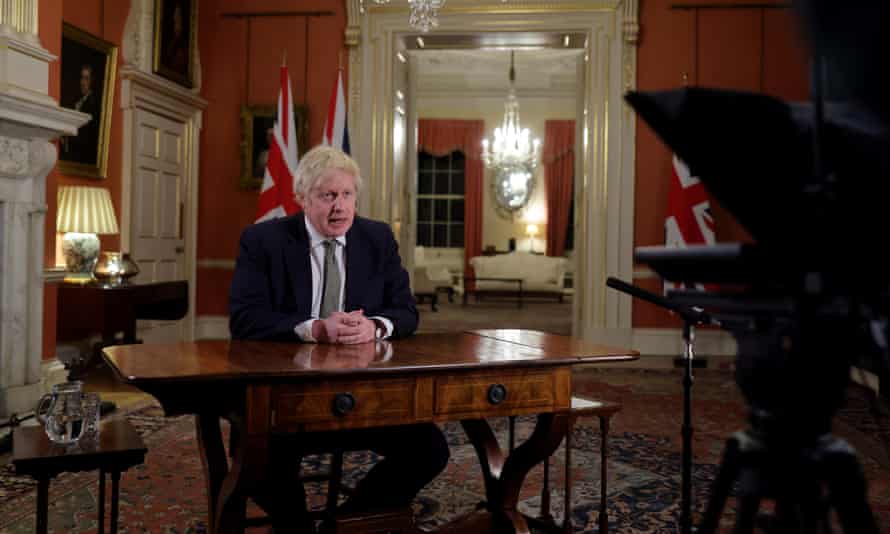
In hindsight, the clues were there for everyone to see. Last week, the government forced a vote on extending recess by an extra week until 11 January. After all, it wasn’t as if there was a lot on for MPs to scrutinise. Brexit was bound to be going swimmingly and the coronavirus was near enough completely under control. So sure enough, on the very first day of its prolonged holiday, Boris Johnson announced that parliament would be recalled on Wednesday.
It’s now becoming easier and easier to predict government policy. Just listen to what the prime minister said in the morning and the opposite is likely to be true come the middle of the afternoon. It’s almost like clockwork – the government does what most reasonable people would have done several weeks earlier.
At every stage in the coronavirus pandemic, the government has been hopelessly behind the curve. From being late to lockdown in March while the Cheltenham festival and Carrie Symonds’s baby shower went ahead. From ignoring the Sage advice in September for a second national lockdown and being forced into one in November by both Keir Starmer and the rapidly rising rates of infection. From announcing a five-day Christmas free-for-all in early December – everyone knew Covid liked to take time off over the holiday period – which he then had to cancel after everyone had already made their plans.
During the biggest national health crisis in 100 years, it’s just our luck to have Johnson in charge. A man pathologically unable to make the right calls at the right time. The prime minister is a narcissistic charlatan. The Great Dick Faker. Someone who can’t bear to be the bearer of bad news or to be proved wrong by people who disagree with him. So he stubbornly ignores the evidence until he becomes overwhelmed by it and public opinion has turned against him. He isn’t just a liability as a leader, his indecision has cost lives. His hubris will only cost him his job.
So the day started off much like any other day for Boris. A quick feelgood photo opportunity jaunt to watch someone get the Oxford/AstraZeneca vaccine on its first day of national distribution and a short clip to camera. Schools should definitely remain open, he insisted, apparently oblivious to the fact that most health and teaching professionals had said otherwise.
But Boris thought differently. Most schoolkids only got a mild dose of Covid and the teachers should stop moaning. Despite the increased infectivity of the new coronavirus variant, teachers should take one for the team as children couldn’t afford to fall further behind in their education. It didn’t seem to have occurred to him that children also have parents and grandparents with whom they live and who might not be so lucky.
There might be a time for increasing restrictions – Nicola Sturgeon announced Scotland’s early in the afternoon and the Labour leader had made a second appeal in two days for Johnson to see sense – but now was not the right time. Which begged the question: “If not now, then when?”
With infections increasing exponentially, the death rate rising and hospitals struggling to cope with the rate of admissions, just how many more people would have to get seriously ill before Boris could be bothered to take action?
As it happened, not many. Because shortly after filming this interview and insisting there would be no No 10 press conference that evening, Johnson announced he would be addressing the nation on TV at 8pm. Yet again, Boris had been shamed into another U-turn. Better late than never. Though too late for some.
For his TV address, a dishevelled Boris – why change the habit of a lifetime and make it look like you give a toss? – didn’t look serious so much as scared shitless. Someone for whom reality had – temporarily at least – penetrated his self-delusion. There was little way to sugarcoat the news, despite him talking up the vaccine. No triumphs to be declared, no ersatz leadership theatrics for reassurance. Only the despair of a down-on-his-luck TV evangelist was on offer in the eight-minute statement.
He began as if the huge rise in coronavirus cases had come as a massive shock to him at lunchtime, even though it was old news to the rest of the country, and spoke of his deep regret – the hurt was all his – at putting the country back into a total lockdown. Including closing the schools he had opened that morning.
“Some of you might be wondering why we haven’t done this before,” he said. A question literally no one was asking as no one expects anything but incompetence and delay from this government any more. Typically, there was nothing about financial support for those whose livelihoods may be affected. He ended by saying that if all went well, there could be an easing of the lockdown by mid-February.
But not even The Great Dick Faker, the master of self-deception, sounded convinced by this. As usual he didn’t have the balls to level with the country and tell us what we all deep down know. That it’s going to take at least three months before there’s even a hint of a return to normality. And that’s if we’re lucky.
“So we beat on, boats against the current, borne back ceaselessly into the past.”
